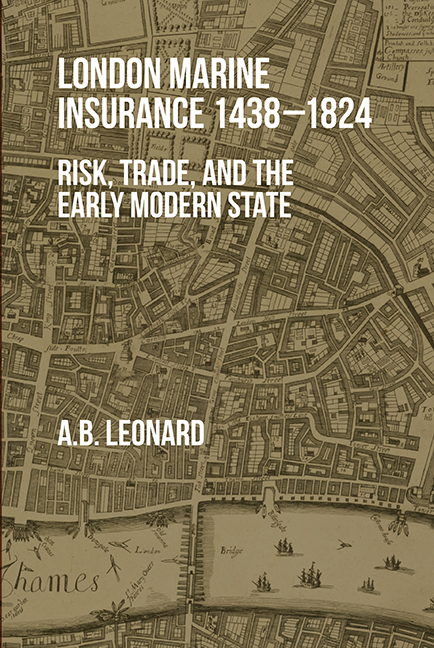Book contents
- Frontmatter
- Contents
- List of Illustrations
- Preface
- Glossary of marine insurance terms
- Introduction
- 1 The merchant-insurers’ system: London marine insurance to the 1570s
- 2 1570–1688: Buyers and the first intervention
- 3 1688–1720: The sellers’ intervention
- 4 To 1824: Lloyd’s and the common law
- 5 Conclusions
- Appendix: Some London underwriters active 1690–1717
- Bibliography
- Index
2 - 1570–1688: Buyers and the first intervention
Published online by Cambridge University Press: 26 May 2022
- Frontmatter
- Contents
- List of Illustrations
- Preface
- Glossary of marine insurance terms
- Introduction
- 1 The merchant-insurers’ system: London marine insurance to the 1570s
- 2 1570–1688: Buyers and the first intervention
- 3 1688–1720: The sellers’ intervention
- 4 To 1824: Lloyd’s and the common law
- 5 Conclusions
- Appendix: Some London underwriters active 1690–1717
- Bibliography
- Index
Summary
This chapter describes the first major intervention into the operations of the London insurance market, which was made in the years 1574 to 1601. It was a series of institution-building initiatives which were intended to answer challenges to the effectiveness of the incumbent system of the merchant-insurers. The system's shortcomings had been brought into sharp focus by the actions of outsider-buyers who wished to perpetrate fraud against underwriters, but the intervention was extended, perhaps beyond the wishes of the merchant-insurers, to measures which would both address the burden of outsiders who would not play by the merchant-insurers’ rules of the game, and would set some restrictions on the operation of the market. The measures had the further aim of resolving the jurisdiction battle between different royal courts over the right to hear insurance disputes, and to ensure that merchants’ customary practices and Law Merchant principles were brought to bear on those disputes which did arise. The intervention was sympathetic to merchant needs, and was structured such that it preserved much of the flexibility which characterised insurance practice in London. In this way it served further to formalise and entrench merchant practice in London. Ultimately, however, it was unsuccessful.
European trade and trade finance were expanding in the last decades of the sixteenth century, fuelled by a hundred years of economic recovery, urbanisation, and exploitation of new Atlantic trade. An initial engine was the international Bisenzone exchange fairs, which, at the orchestration of Genoese bankers, spread risk and credit in the European mercantile community. It was also a period of increased state monitoring of, and intervention in, cross-border commerce. England, whose international trade had been dominated by foreign merchants, began the long reversal of its industrial backwardness relative to its Continental contemporaries. Merchants enhanced internal trade networks, and, as Hanse merchants were squeezed, then expelled, gained much-increased local control over international trade, despite later competition from Dutch carriers.
Internal and external trade alike were centred on London. The latter, dominated on the export side by cloth, was heavily focused on Europe, a situation not helped by Cockayne's disastrous project to establish a local wool-dyeing industry, but eased by the rise of the new draperies.
- Type
- Chapter
- Information
- London Marine Insurance 1438-1824Risk, Trade, and the Early Modern State, pp. 73 - 108Publisher: Boydell & BrewerPrint publication year: 2022



